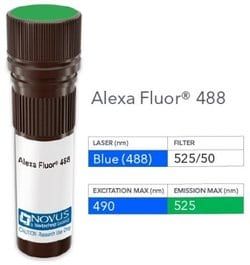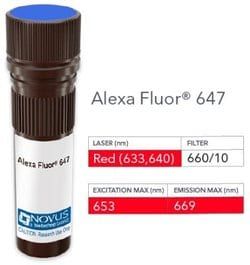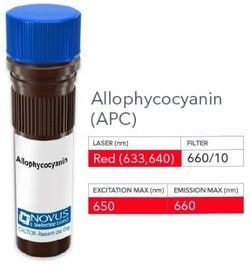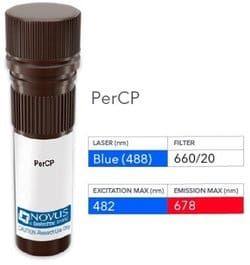Glypican 3 Antibody (1G12 + GPC3/863), Alexa Fluor™ 488, Novus Biologicals™
Manufacturer: Novus Biologicals
Select a Size
| Pack Size | SKU | Availability | Price |
|---|---|---|---|
| Each of 1 | NB247763488-Each-of-1 | In Stock | ₹ 57,494.00 |
NB247763488 - Each of 1
In Stock
Quantity
1
Base Price: ₹ 57,494.00
GST (18%): ₹ 10,348.92
Total Price: ₹ 67,842.92
Antigen
Glypican 3
Classification
Monoclonal
Conjugate
Alexa Fluor 488
Formulation
50mM Sodium Borate with 0.05% Sodium Azide
Gene Symbols
GPC3
Immunogen
Recombinant fragment containing amino acids 511-580 of human Glypican 3 (1G12); Recombinant full-length human GPC3 protein (GPC3/863) (Uniprot: P51654)
Quantity
0.1 mL
Gene ID (Entrez)
2719
Target Species
Human
Form
Purified
Applications
Flow Cytometry, Immunohistochemistry, Immunocytochemistry, Immunofluorescence, Immunohistochemistry (Paraffin)
Clone
1G12 + GPC3/863
Dilution
Flow Cytometry, Immunohistochemistry, Immunocytochemistry/Immunofluorescence, Immunohistochemistry-Paraffin, Immunofluorescence
Gene Alias
DGSX, glypican 3, glypican proteoglycan 3, glypican-3, GTR2-2, heparan sulphate proteoglycan, Intestinal protein OCI-5, MXR7, OCI5, OCI-5, secreted glypican-3, SGB, SGBS, SGBS1SDYS
Host Species
Mouse
Purification Method
Protein A or G purified
Primary or Secondary
Primary
Test Specificity
Glypican-3 (GPC3) is an integral membrane protein that is mutated in the Simpson-Golabi-Behmel syndrome (SGBS). SGBS is characterized by pre- and post-natal overgrowth and is a recessive X-linked condition.GPC3 may also be found in a secreted form. Anti-GPC3 has been identified as a useful tumor marker for the diagnosis of hepatocellular carcinoma (HCC), hepatoblastoma, melanoma, testicular germ cell tumors, and Wilms tumor and hepatoblastoma, with a low or undetectable expression in normal adjacent tissue. In patients with thyroid cancer, expression of GPC3 is dramatically enhanced in certain types of cancers: 100% in follicular carcinoma and 70% in papillary carcinoma. Expression of GPC3 in follicular carcinoma was significantly higher than that of follicular adenoma. In contrast, GPC 3 is not expressed in anaplastic carcinoma.
Content And Storage
Store at 4C in the dark.
Isotype
IgG1 κ
Description
- Glypican 3 Monoclonal specifically detects Glypican 3 in Human samples
- It is validated for Flow Cytometry, Immunohistochemistry, Immunocytochemistry/Immunofluorescence, Immunohistochemistry-Paraffin, Immunofluorescence.



